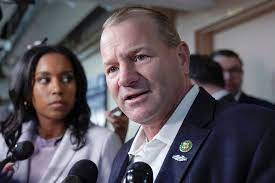In the intricate web of American politics, the concept of ethics serves as a guiding compass, ensuring that elected officials uphold the trust and integrity of their positions. However, recent developments have brought to light the complexities and challenges surrounding campaign finances and the scrutiny they face under the lens of congressional oversight. The House Ethics Committee’s investigation into GOP Rep. Troy Nehls sheds light on these issues, prompting a closer examination of the intersection between political funding and ethical standards.
The revelation of Rep. Nehls’ investigation, disclosed by the House Ethics Committee, has sparked considerable interest and speculation within the political sphere. The nature of the investigation, purportedly related to Nehls’ campaign finances, has raised questions about compliance with federal election laws and transparency in financial reporting. Nehls himself has affirmed his full cooperation with the probe, emphasizing his campaign’s adherence to Federal Election Commission (FEC) regulations and the openness of his financial records.
At the heart of the matter lies the delicate balance between political operations and ethical responsibilities. Campaign finances serve as the lifeblood of political campaigns, enabling candidates to communicate their message, engage with constituents, and compete in the electoral arena. However, the influx of money into political campaigns has also been a source of contention, raising concerns about the influence of special interests, potential conflicts of interest, and the integrity of the democratic process.
For Rep. Nehls and others facing similar scrutiny, the implications of an ethics investigation are multifaceted. Beyond the immediate impact on their political careers and reputations, such inquiries underscore the importance of accountability and transparency in public office. The House Ethics Committee, tasked with overseeing the conduct of members of Congress, plays a crucial role in upholding these principles and ensuring the integrity of the legislative branch.
Moreover, Nehls’ assertion that the investigation is driven by “politics” highlights the inherently partisan nature of congressional proceedings. In an era marked by heightened political polarization, allegations of misconduct or impropriety are often weaponized for political gain, further complicating the pursuit of truth and justice. As lawmakers navigate these turbulent waters, it becomes imperative to uphold the principles of fairness, impartiality, and due process, irrespective of party affiliation or ideological differences.
Ultimately, the outcome of Rep. Nehls’ investigation will have far-reaching implications for the broader landscape of congressional ethics and campaign finance regulation. Whether it serves as a cautionary tale or a testament to the resilience of democratic institutions remains to be seen. However, one thing is clear: the pursuit of ethical governance is an ongoing endeavor, requiring vigilance, accountability, and a commitment to the highest standards of integrity.
